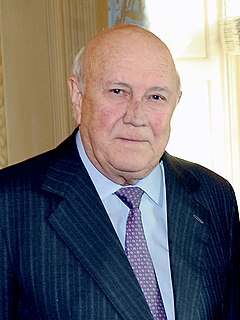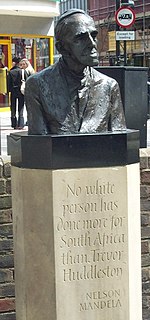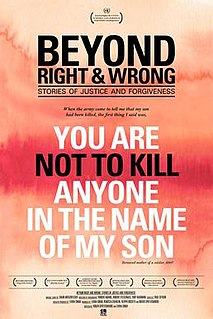
Frederik Willem de Klerk is a South African politician who served as State President of South Africa from 1989 to 1994 and as Deputy President from 1994 to 1996. As South Africa's last head of state from the era of white-minority rule, he and his government dismantled the apartheid system and introduced universal suffrage. Ideologically a conservative and an economic liberal, he led the National Party from 1989 to 1997.

Winnie Madikizela-Mandela, also known as Winnie Mandela, was a South African anti-apartheid activist and politician, and the second wife of Nelson Mandela. She served as a Member of Parliament from 1994 to 2003, and from 2009 until her death, and was a deputy minister of arts and culture from 1994 to 1996. A member of the African National Congress (ANC) political party, she served on the ANC's National Executive Committee and headed its Women's League. Madikizela-Mandela was known to her supporters as the "Mother of the Nation".
Great South Africans was a South African television series that aired on SABC3 and hosted by Noeleen Maholwana Sangqu and Denis Beckett. In September 2004, thousands of South Africans took part in an informal nationwide poll to determine the "100 Greatest South Africans" of all time. Votes were cast by telephone, SMS, and the website of the state-run South African Broadcasting Corporation television channel, SABC3, which aired a series of profiles and documentaries in the weeks leading up to the announcement of the top 100. The programme was modelled on the BBC's Greatest Britons series.

Ernest Urban Trevor Huddleston was an English Anglican bishop. He was the Bishop of Stepney in London before becoming the second Archbishop of the Church of the Province of the Indian Ocean. He was best known for his anti-apartheid activism and his book Naught for Your Comfort.

Rainbow Nation is a term coined by Archbishop Desmond Tutu to describe post-apartheid South Africa, after South Africa's first fully democratic election in 1994.

On 13 September 1989, 30 000 Capetonians from a diverse cross-section of the city marched in support of peace and the end of apartheid. The event, led by Mayor Gordon Oliver, Archbishop Tutu, Rev Frank Chikane, Moulana Farid Esack, Allan Boesak, and other religious leaders, was held in defiance of the State of Emergency which banned political protests and apartheid laws which enforced racial segregation. The march resulted in concessions from the apartheid cabinet headed by FW de Klerk, following years of violent clashes between anti-apartheid protestors and the police, and was the first such event to include elected world government functionaries. It was considered the "last illegal march" at the time, and went ahead without major confrontation. The size of the protest, despite the open defiance, and the restrained response from the police signalled the beginning of the transition to democracy.

Desmond Mpilo Tutu is a South African Anglican cleric and theologian known for his work as an anti-apartheid and human rights activist. He was the Bishop of Johannesburg from 1985 to 1986 and then the Archbishop of Cape Town from 1986 to 1996, in both cases being the first black African to hold the position. Theologically, he sought to fuse ideas from black theology with African theology; politically, he identifies as a socialist.

The Elders is an international non-governmental organisation of public figures noted as elder statesmen, peace activists, and human rights advocates, who were brought together by Nelson Mandela in 2007. They describe themselves as "independent global leaders working together for peace and human rights". The goal Mandela set for the Elders was to use their "almost 1,000 years of collective experience" to work on solutions for seemingly insurmountable problems such as climate change, HIV/AIDS, and poverty, as well as to "use their political independence to help resolve some of the world's most intractable conflicts".
ProjectExplorer is a documentary short film series. The films, directed and produced by ProjectExplorer's Founder, Jenny M Buccos, focus on histories and cultures of foreign places and people using interviews with subject experts, artists, and public figures including Archbishop Desmond Tutu, Dr. John Kani, Greg Marinovich, and Sipho “Hotstix” Mabuse. Produced for a child and young adult audience, segments in each series depict everyday life and the challenges and concerns of those living in the locations and regions featured. Each film is 2–4 minutes in length, with each series containing approximately 40 films.

The United States and South Africa currently maintain bilateral relations with one another. The United States and South Africa have been economically linked to one another since the late 18th century which has continued into the 21st century. U.S. and South Africa relations faced periods of strain throughout the 20th century due to the segregationist, white rule in South Africa, from 1948–1994. Following apartheid in South Africa, the U.S. and South Africa have developed a strategically, politically, and economically beneficial relationship with one another.
Nobelity is a feature documentary which looks at the world's most pressing problems through the eyes of Nobel laureates, including Desmond Tutu, Sir Joseph Rotblat, Ahmed Zewail and Wangari Maathai.

South Africa-Palestine relations refer to the interstate relations between the Republic of South Africa and the State of Palestine.

Beyond Right & Wrong: Stories of Justice and Forgiveness is a 2012 American documentary film about restorative justice and forgiveness. It is directed by Roger Spottiswoode and Lekha Singh and produced by Lekha Singh and Rebecca Chaiklin. The film depicts victims and perpetrators of the Rwandan genocide, the Israeli–Palestinian conflict, and The Troubles in Northern Ireland.

The Tutu House is a house on Vilakazi Street in Soweto, Johannesburg, South Africa that belongs to Desmond Tutu and his family. The house is registered as part of Johannesburg's historical heritage.
Mandela: The Struggle Is My Life is a documentary co-produced by Sky News and Sky Vision following the life of Nelson Mandela. It contains unique archive footage from Sky News and exclusive interviews with key figures from Mandelas life, including Desmond Tutu, F. W. De Klerk, and members of the ANC who fought with him and were imprisoned with him.
Brian Lisus is a violin maker born in South Africa, who started the first violin making School in South Africa. He is currently teaching in Ojai, California, US, and owns a violin making shop there.
In September 2006, 10 Nobel Peace Laureates and more than 3,000 young people traveled from all over the world to Denver, Colorado, to celebrate the 10th Anniversary of the PeaceJam Foundation. The 14th Dalai Lama, Archbishop Desmond Tutu, Rigoberta Menchú Tum, President Oscar Arias, Adolfo Pérez Esquivel, Mairead Maguire, Betty Williams, José Ramos-Horta, Jody Williams, and Shirin Ebadi came together in the largest gathering of Nobel Peace Laureates ever held in U.S. history. They announced plans for a 10-year campaign, now known as the One Billion Acts of Peace campaign, designed to tackle what they perceive as the 10 greatest challenges to the survival of humanity and the well-being of our planet today.
Sir Nicholas Felix Stadlen is a former judge of the High Court of England and Wales. He was appointed to the High Court's Queen's Bench Division on 2 October 2007 and retired early, on 21 April 2013.
On 18 July 1984, Mary Manning, a shop worker in the Henry Street, Dublin (Ireland) outlet of Dunnes Stores, refused to handle the sale of grapefruit from South Africa. Her union, IDATU, had issued directions to its members not to handle South African produce in protest of South African apartheid policies. When Manning and shop steward Karen Gearon continued to refuse to handle South African produce, they were suspended and ten IDATU members working in the store went on strike. The additional striking workers were

Nobel Square is a public square in the Victoria & Alfred Waterfront neighborhood of Cape Town, South Africa. It opened in December 2005 and includes sculptures of the country's four Nobel Peace Prize winners, Albert Lutuli, Desmond Tutu, F. W. de Klerk, and Nelson Mandela. The square was the brainchild of Ebrahim Rasool, Premier of Western Cape from 2004 to 2008, and his predecessor Marthinus van Schalkwyk. Supported by the government of the Western Cape, the project was launched after consultations with Lutuli's family and the still-living Prize winners, who attended the unveiling with Lutuli's daughter and the Norwegian Ambassador to South Africa. The statues, slightly taller than the four people depicted, are arranged in a semicircle with their backs to Table Mountain. Quotes of each figure are inscribed on the ground in front of them. A fifth sculpture, entitled "Peace and Democracy," represents the role of women and children in the anti-apartheid movement. All five sculptures are bronze and stand on a 386-m² granite surface. A competition invited ten artists from around South Africa to submit proposals, with Claudette Schreuders's entry inspiring the four sculptures of Nobel winners and Noria Mabasa's idea selected for "Peace and Democracy."











